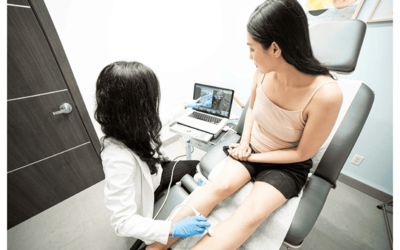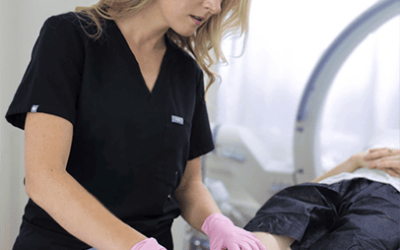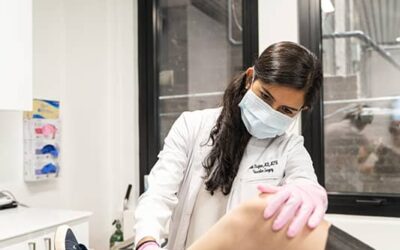What is a Vein Clinic?
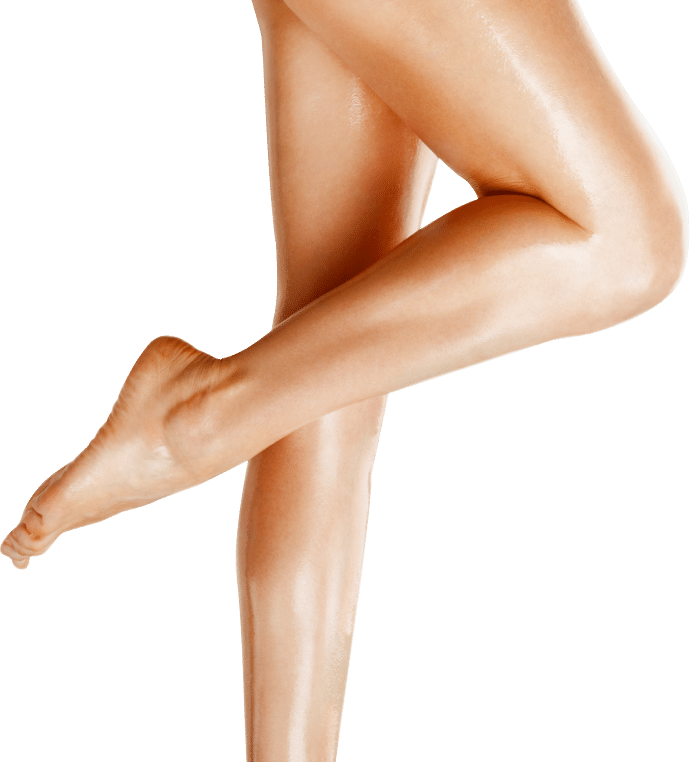
What is a Vein Clinic?
A vein clinic is a medical center focusing primarily on vascular health and vein treatments. It’s led by a team of vein doctors, also known as phlebologists.
What do Vein Clinics do?
Vein clinics diagnose and treat vein conditions, such as spider veins, varicose veins, and chronic venous insufficiency. If you have the signs and symptoms of vein disease, the vein doctors in vein clinics will diagnose the root cause of your vein problems and curate a personalized vein treatment plan.
Our spider vein and varicose vein treatment clinics in NJ only provide minimally invasive vein treatments. We have a stellar track record with vein treatments, ensuring optimal and consistent results without downtime or complications. If you have the signs and symptoms of vein disease, please schedule an appointment at our vein clinics in Paramus or Clifton, NJ.
What can I Expect at a Vein Clinic?
We can’t speak for all vein clinics because different vein clinics have different treatment protocols. However, when you schedule an appointment at our vein clinic in New Jersey, you can expect comprehensive diagnosis and treatment. Our vein doctors always diagnose the root cause of your vein problems before curating a minimally invasive treatment plan to ensure optimal and consistent results with a negligible risk of complications. Below, we provide a step-by-step overview of our entire vein treatment process.
#1. Expect a thorough consultation with the vein doctor.
The vein doctor will start with a thorough consultation to understand your goals and determine whether you have chronic venous insufficiency. They’ll examine your leg veins to study the size, location, and spread of spider veins, reticular veins, or varicose veins. They’ll also review your medical history and ask about your family history — a history of vein problems or a family history of vein disease indicates a high risk of chronic venous insufficiency. Finally, the vein doctor will also ask about your symptoms. You should honestly list out all your symptoms — leg heaviness, restless leg syndrome, leg cramps, leg swelling, and skin discoloration are common symptoms of vein disease.
#2. Expect an ultrasound diagnostic test.
After the consultation, the vein doctor will administer an advanced ultrasound diagnostic test known as duplex ultrasound. This test involves using ultrasound energy to visualize the blood flow in your leg veins. Backward blood circulation and accumulated blood in leg veins indicate chronic venous insufficiency. Your vein specialist will curate a personalized vein treatment plan after confirming if you have chronic venous insufficiency.
#3. Expect a discussion of your vein treatment options.
After the diagnostic test, your vein doctor will discuss all your vein treatment options. If you have chronic venous insufficiency, the vein doctor will recommend radiofrequency ablation, endovenous laser ablation, or venaseal. If you don’t have vein disease, the vein doctor will recommend sclerotherapy or ambulatory phlebectomy to remove the superficial varicose veins and spider veins. Furthermore, the vein doctor will highlight the differences between all of your vein treatment options, helping you make an informed decision. You’ll also receive a complete overview of your vein treatment costs with each procedure, including the possibility of insurance coverage. In short, you receive all the information needed to make an informed decision.
#4. Expect minimally invasive vein treatments.
Your primary vein treatment will start with radiofrequency ablation, endovenous laser ablation, or venaseal. The vein doctor will make a small incision on the skin’s surface to insert a catheter into the diseased vein under ultrasound guidance. Once the catheter is in place, the vein doctor will channel thermal energy, laser energy, or medical-grade adhesives to destroy or seal the diseased vein. The accumulated blood will reroute into healthier leg veins. After the primary vein treatment, the vein doctor will focus on cosmetic relief. Sclerotherapy involves injecting a sclerosant solution into the spider veins, turning them into hardened scar tissues eventually absorbed by the body.
#5. Expect to resume your daily activities immediately.
Minimally invasive spider vein and varicose vein treatments conclude within 30 to 60 minutes and involve no downtime. You may experience mild swelling, discomfort, and irritation on your legs, but those side effects can be managed with over-the-counter pain medications. If you undergo venaseal, you may also feel a little firmness in your legs — that’s because the diseased vein will harden and eventually get absorbed by the body. However, you can resume most of your daily activities immediately, provided you avoid strenuous workouts for a few days. You should also wear compression stockings for a few days to prevent blood accumulation in your leg veins.

BOOK AN APPOINTMENT
Do you have any symptoms? Consult now with one of the Best Vein Specialist in New Jersey
Your information is encrypted and secure. By registering you confirm that you accept Terms and Conditions and Privacy Policy
Is Vein Treatment Painful?
Minimally invasive vein treatments don’t cause any pain or discomfort. They’re performed under local anesthesia and tumescent anesthesia, so there’s no pain. You may feel a little discomfort after the treatment, but that can be managed with over-the-counter pain medications.
How Safe is Vein Treatment?
Minimally invasive vein treatments are extremely safe and effective, with a nearly perfect success rate. They carry a negligible risk of complications, which you can avoid by consulting reliable vein doctors with years of experience and advanced training.
Can you get rid of Varicose Veins Without Surgery?
Yes. You can get rid of varicose veins without surgery. In fact, you should avoid vein doctors that recommend surgical treatments for varicose veins. You should only opt for minimally invasive varicose vein treatments that involve injections or a small incision.
How Long will I Need Off Work After Varicose Vein Surgery?
Minimally invasive vein treatments don’t involve any social or professional downtime. You can also schedule the treatment during your lunch break and then resume work immediately after. As such, varicose vein treatments don’t interfere with your daily activities.
NJ Vein Doctors
Meet our team of New Jersey Vein Treatment Specialists
Vein Treatments are covered by most major medical insurances, including Medicare. Call us today to verify your insurance for FREE >
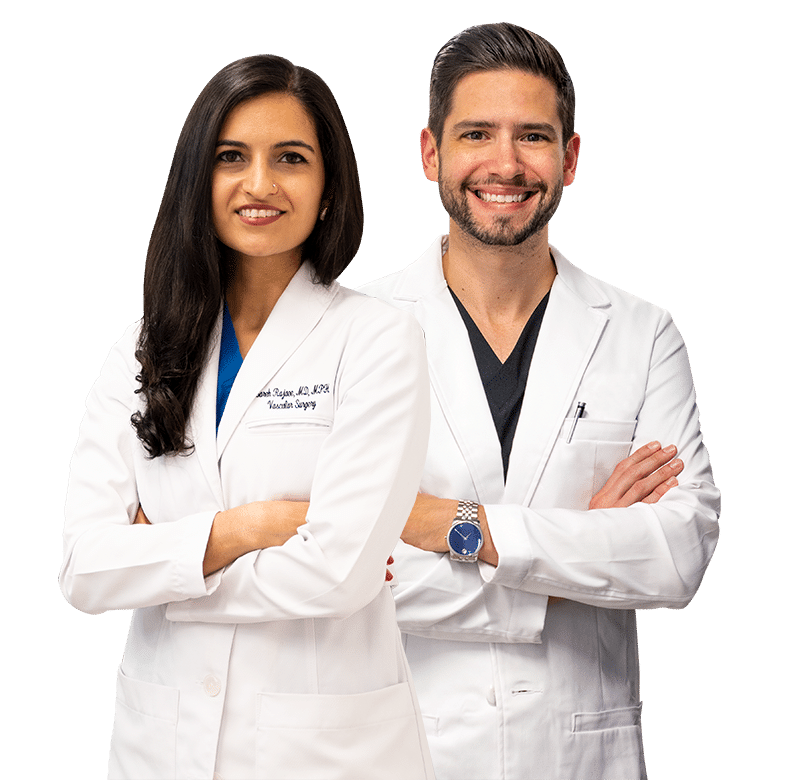
Meet our Team of Top Vein Specialists in New Jersey
Contact us
CALL US
Speak instantly with one of our team members; they will answer any questions you may have regarding insurance coverage, booking an appointment and our vein treatment locations. (973) 447-3227
BOOK APPOINTMENT
Visit our Book Appointment page and instantly request an appointment at the New Jersey vein center. We offer Free Insurance Verification before your appointment.
